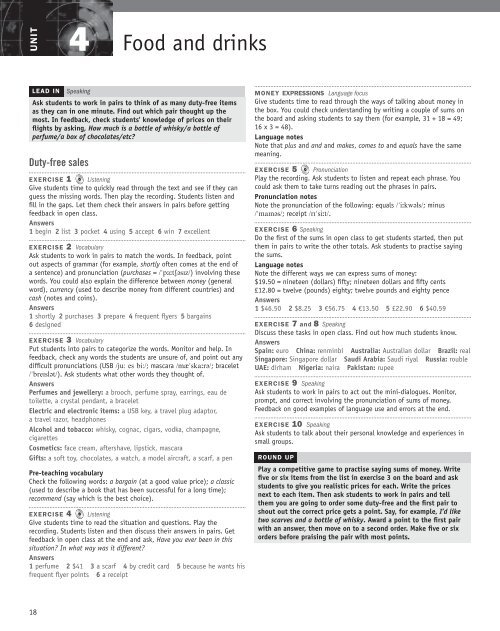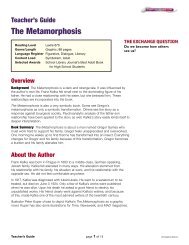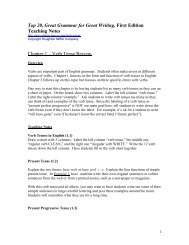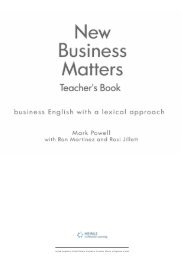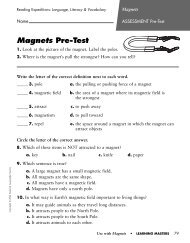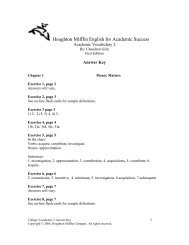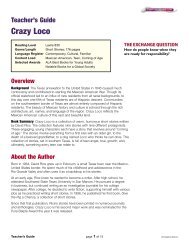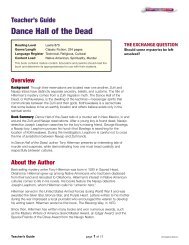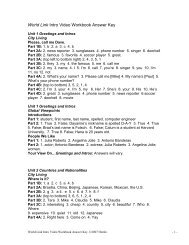English for Cabin Crew Trainer's Guide - Heinle
English for Cabin Crew Trainer's Guide - Heinle
English for Cabin Crew Trainer's Guide - Heinle
Create successful ePaper yourself
Turn your PDF publications into a flip-book with our unique Google optimized e-Paper software.
UNIT<br />
4 Food and drinks<br />
LEAD IN Speaking<br />
Ask students to work in pairs to think of as many duty-free items<br />
as they can in one minute. Find out which pair thought up the<br />
most. In feedback, check students' knowledge of prices on their<br />
fl ights by asking, How much is a bottle of whisky/a bottle of<br />
perfume/a box of chocolates/etc?<br />
Duty-free sales<br />
EXERCISE 1 Listening<br />
Give students time to quickly read through the text and see if they can<br />
guess the missing words. Then play the recording. Students listen and<br />
fi ll in the gaps. Let them check their answers in pairs be<strong>for</strong>e getting<br />
feedback in open class.<br />
Answers<br />
1 begin 2 list 3 pocket 4 using 5 accept 6 win 7 excellent<br />
EXERCISE 2 Vocabulary<br />
Ask students to work in pairs to match the words. In feedback, point<br />
out aspects of grammar (<strong>for</strong> example, shortly often comes at the end of<br />
a sentence) and pronunciation (purchases = /"p3;tS@sIz/) involving these<br />
words. You could also explain the difference between money (general<br />
word), currency (used to describe money from different countries) and<br />
cash (notes and coins).<br />
Answers<br />
1 shortly 2 purchases 3 prepare 4 frequent fl yers 5 bargains<br />
6 designed<br />
EXERCISE 3 Vocabulary<br />
Put students into pairs to categorize the words. Monitor and help. In<br />
feedback, check any words the students are unsure of, and point out any<br />
diffi cult pronunciations (USB /ju: es bi:/; mascara /m&"ska;r@/; bracelet<br />
/"breIsl@t/). Ask students what other words they thought of.<br />
Answers<br />
Perfumes and jewellery: a brooch, perfume spray, earrings, eau de<br />
toilette, a crystal pendant, a bracelet<br />
Electric and electronic items: a USB key, a travel plug adaptor,<br />
a travel razor, headphones<br />
Alcohol and tobacco: whisky, cognac, cigars, vodka, champagne,<br />
cigarettes<br />
Cosmetics: face cream, aftershave, lipstick, mascara<br />
Gifts: a soft toy, chocolates, a watch, a model aircraft, a scarf, a pen<br />
Pre-teaching vocabulary<br />
Check the following words: a bargain (at a good value price); a classic<br />
(used to describe a book that has been successful <strong>for</strong> a long time);<br />
recommend (say which is the best choice).<br />
EXERCISE 4 Listening<br />
Give students time to read the situation and questions. Play the<br />
recording. Students listen and then discuss their answers in pairs. Get<br />
feedback in open class at the end and ask, Have you ever been in this<br />
situation? In what way was it different?<br />
Answers<br />
1 perfume 2 $41 3 a scarf 4 by credit card 5 because he wants his<br />
frequent fl yer points 6 a receipt<br />
18<br />
MONEY EXPRESSIONS Language focus<br />
Give students time to read through the ways of talking about money in<br />
the box. You could check understanding by writing a couple of sums on<br />
the board and asking students to say them (<strong>for</strong> example, 31 + 18 = 49;<br />
16 x 3 = 48).<br />
Language notes<br />
Note that plus and and and makes, comes to and equals have the same<br />
meaning.<br />
EXERCISE 5 Pronunciation<br />
Play the recording. Ask students to listen and repeat each phrase. You<br />
could ask them to take turns reading out the phrases in pairs.<br />
Pronunciation notes<br />
Note the pronunciation of the following: equals /"i;kw@ls/; minus<br />
/"maIn@s/; receipt /rI"si;t/.<br />
EXERCISE 6 Speaking<br />
Do the fi rst of the sums in open class to get students started, then put<br />
them in pairs to write the other totals. Ask students to practise saying<br />
the sums.<br />
Language notes<br />
Note the different ways we can express sums of money:<br />
$19.50 = nineteen (dollars) fi fty; nineteen dollars and fi fty cents<br />
£12.80 = twelve (pounds) eighty; twelve pounds and eighty pence<br />
Answers<br />
1 $46.50 2 $8.25 3 €56.75 4 €13.50 5 £22.90 6 $40.59<br />
EXERCISE 7 and 8 Speaking<br />
Discuss these tasks in open class. Find out how much students know.<br />
Answers<br />
Spain: euro China: renminbi Australia: Australian dollar Brazil: real<br />
Singapore: Singapore dollar Saudi Arabia: Saudi riyal Russia: rouble<br />
UAE: dirham Nigeria: naira Pakistan: rupee<br />
EXERCISE 9 Speaking<br />
Ask students to work in pairs to act out the mini-dialogues. Monitor,<br />
prompt, and correct involving the pronunciation of sums of money.<br />
Feedback on good examples of language use and errors at the end.<br />
EXERCISE 10 Speaking<br />
Ask students to talk about their personal knowledge and experiences in<br />
small groups.<br />
ROUND UP<br />
Play a competitive game to practise saying sums of money. Write<br />
fi ve or six items from the list in exercise 3 on the board and ask<br />
students to give you realistic prices <strong>for</strong> each. Write the prices<br />
next to each item. Then ask students to work in pairs and tell<br />
them you are going to order some duty-free and the fi rst pair to<br />
shout out the correct price gets a point. Say, <strong>for</strong> example, I’d like<br />
two scarves and a bottle of whisky. Award a point to the fi rst pair<br />
with an answer, then move on to a second order. Make fi ve or six<br />
orders be<strong>for</strong>e praising the pair with most points.


